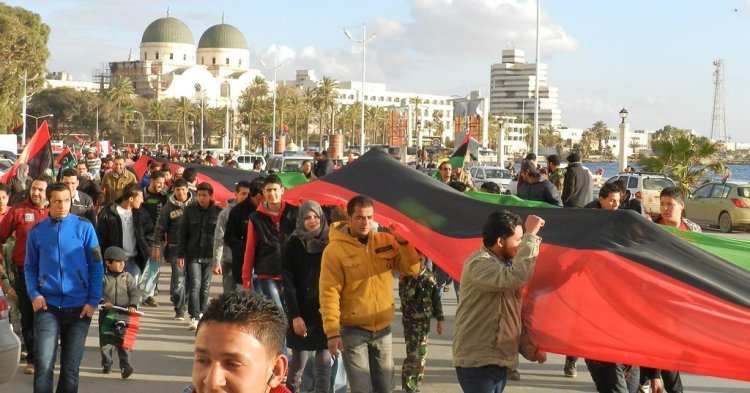A polarisation of the Libyan crisis
Following the fall of Muammar Gaddafi’s regime in the autumn of 2011, Libya never managed to rebuild a stable and unified government in the whole of its territory. This territory, more than twice the size of France, is indeed under the control of various different militias with quite opposite views on the future of the country, which has led to a situation of permanent civil war since 2011. However on July 7th, 2012, Libya organised the first democratic elections in its history, leading to the creation of the General National Congress (GNC), a Constituent Assembly of 200 members charged with drafting the new Libyan Constitution.
Nevertheless, the violence has persisted, as the Tripoli central government couldn’t establish its authority and legitimacy in the rest of the country. It is in this peculiar political climate that new elections were held in early 2014 to replace the GNC with the House of the Representatives (HoR). This vote was not recognised, though, by the Islamist parties, who lost many seats in this second election and had some influence in the first parliament. They therefore decided to re-establish the GNC.
The HoR was then forced to flee to Tobruk, in the North-East of the country. The Skhirat peace agreement was signed on December 17th, 2015, backed by the United Nations, in order to put an end to hostilities between the two opposing assemblies. The agreement establishes the creation of a Government of National Accord, presided over by Fayez al-Serraj, and of a bicameral parliament (with the HoR becoming the Libyan Parliament and the GNC the High Council of State). In spite of the agreement, the Tobruk-based HoR went back on its commitment, under the influence of General Khalifa Haftar, former supporter of Gaddafi who quickly distanced himself from the regime and went into exile in the U.S. in 1990. During the first civil war (in 2011, that toppled the regime), he went back to Libya to back the insurrection. He was consequently promoted to Commander in Chief of the Libyan National Army, which controls the eastern part of Libya.
The current situation is hence polarised between two men. On one side, Fayez al-Serraj, at the head of a Government of National Accord, set up by the international community, but unelected. He now only controls Tripoli and a meagre part of western Libya. On the hand is General Haftar, who appears to be the strong man of Libya. With the help of the Libyan National Army, he took back much of the territory and launched a large attack on the capital on April 3rd 2019.
Foreign interference : an obstacle to real national unity
The first Libyan civil war that led to the toppling of Muammar Gaddafi’s regime was largely the result of support provided by the international coalition (but mainly by NATO) to the different military forces of the National Transition Council that opposed Gaddafi. Conversely, Gaddafi didn’t have such military and logistic support from other great international powers.
This unity of the international community fell apart as the second civil war dragged on, along with the contrasts between Fayez al-Serraj’s Government of National Accord and General Haftar’s Libyan National Army. Libya does whet the appetite of neighbouring countries and international powers alike who in particular wish to access its natural resources. It possesses the largest oil reserves in Africa, and the world’s 5th largest resources of oil shale that can produce combustible oil and gas.
The two protagonists therefore benefit from official and unofficial diplomatic support of foreign powers. For instance, Saudi Arabia, the United Arab Emirates, Egypt, Russia and more recently the US support General Haftar. Conversely, Turkey and Qatar offer their support to to al-Serraj’s Government of National Accord. This power balance between states is clearly visible through the opposing military or political support given during the Libyan National Army’s attack on Tripoli.
The European powers officially stand by the UN Security Council, who had established an embargo from 2011 with the 1970 Resolution, “in order to prevent the direct or indirect supply, selling or transfer” of weapons, ammunition, and similar materials, and had called for political negotiations in 2015.
The EU Foreign Affairs Council released a statement on May 13th, 2019, following the attack on Tripoli : “The EU recalls that there is no military solution to the crisis in Libya and urges all parties to re-commit to the United Nations-facilitated political dialogue”. But this façade of neutrality, which still marks most Council statements, actually leaves space for European states’ divided interests on the matter. Indeed, Italy, the former colonial power in Libya, has strong links with the country and especially in the oil industry. The news network France24 reports that Italy stays neutral in order to better manage its position on international oil markets. France also has an important place on the Libyan stage. Indeed, during the first civil war in 2011, the then French President Nicolas Sarkozy was one of the most in favour of military intervention to support the rebels. Since the division of Libya between al-Serraj and General Haftar, the French government repositioned itself on the neutral side and recalls the importance of UN-led dialogue, as mentioned by the current Foreign Affairs Minister Jean-Yves Le Drian on an early 2020 interview.
Additionally, French President Emmanuel Macron organised an inter-Libyan meeting on July 20th, 2017 between the two main opponents, Haftar and al-Serraj, in the Parisian suburbs of La Celle Saint-Cloud. But this position has been criticised, as France is accused of double dealing by supporting one then the other : evidence of this was given by a New York Times article revealing French Army missiles belonging to General Haftar.
It is in this context of tensions and foreign interference that the Berlin Conference on Libya took place on January 19th, 2020. This meeting, with a number of countries and international stake holders in attendance, recalled the importance of respecting the 2011 embargo and the 2015 Libyan Political Agreement (Resolution 2259).
Operation IRINI : the newcomer in the management of the Libyan crisis
The European Union, through its European External Action Service (EEAS), the body charged with implementing the EU’s foreign policy, ensures regular financial support of humanitarian and development aid. The EU has spent more than 100 million Euros to support Libya, especially in the medical field and civil society.
But the EU also directly intervenes on the field. Since 2013, the EU Border Assistance Mission in Libya (EUBAM Libya) is in place. The aim of this non-military operation is to support Libyan authorities in improving security at the borders. Due to the current situation in Libya, the mission has been moved in Tunisia, and as a consequence it has been reduced and merely handles training and mentoring.
The European Council recently announced the launching of the new IRINI (EUNAVFOR MED) Operation on March 31st, 2020. This mission replaces Operation Sophia, whose primary goal was to combat illegal immigration to the EU through increased surveillance of the Mediterranean region. Operation Sophia was also supposed to save the lives of migrants in distress at sea, and to help Libya manage this crisis. But this operation was limited in early 2019 at the request of the Italian government, who refused to allow the operation to carry out rescue operations.
The new Operation IRINI, which is still part of the Common Security and Defence Policy, is a military operation in the Mediterranean sea, that refocuses on keeping watch on the weapons embargo decided by the United Nations. Lasting for a year, for the moment, it will also have the aim of preventing illegal oil exports, and to train the Libyan navy and coast guard to be able to put an end to human trafficking.
To see this operation through, the European Union will implement air, satellite and maritime military resources. It will be led by the Italian vice-admiral Fabio Agostini and will be based in Rome. This operation, however, has its critics. Notably, the al-Serraj Government of National Accord (GNA) laments that the operation is not deployed on the Libyan land borders, thus allowing General Haftar to transfer weapons from countries that support him, such as Egypt. Without maritime support, the GNA, mainly allied with Turkey and Qatar, is cut off from part of the aid it receives.
But this operation is also fairly questionable from a humanitarian point of view. The pan-African, French-language newspaper Jeune Afrique reported : “Libye : l’opération IRINI est conçue pour ne pas sauver de vies” (“Libya : the IRINI operation was designed not to save human lives”). The title refers to one of the operation’s provisions, according to which, should the presence of IRINI naval forces come to encourage migration from Libya, the operation can be deployed elsewhere. This detail has been added to secure Italy’s approval, as its right-wing government didn’t want to bring more migrants onto its soil after rescue operations.
In a rather symbolic way, doing away with the name of Operation Sophia – which referred to the birth of a child in 2015 on a German navy ship after a rescue operation – clearly testifies to the willingness to end the previous operation and to stop rescuing migrants. In taking this position, the EU is partly going back on its fundamental values of being welcoming and respecting human rights.
The European Union therefore plays a surveillance role, overseeing activities in Libya by positioning military forces off its coasts, in order to ensure control of the embargo and other illegal activities. The IRINI and the supporting EUBAM Libya operations do not, however, seem to provide actual solutions to the conflict, as they aren’t putting a ceasefire in place, and therefore makes opening real negotiations between the different stakeholders impossible.


Suivre les commentaires : |
|
